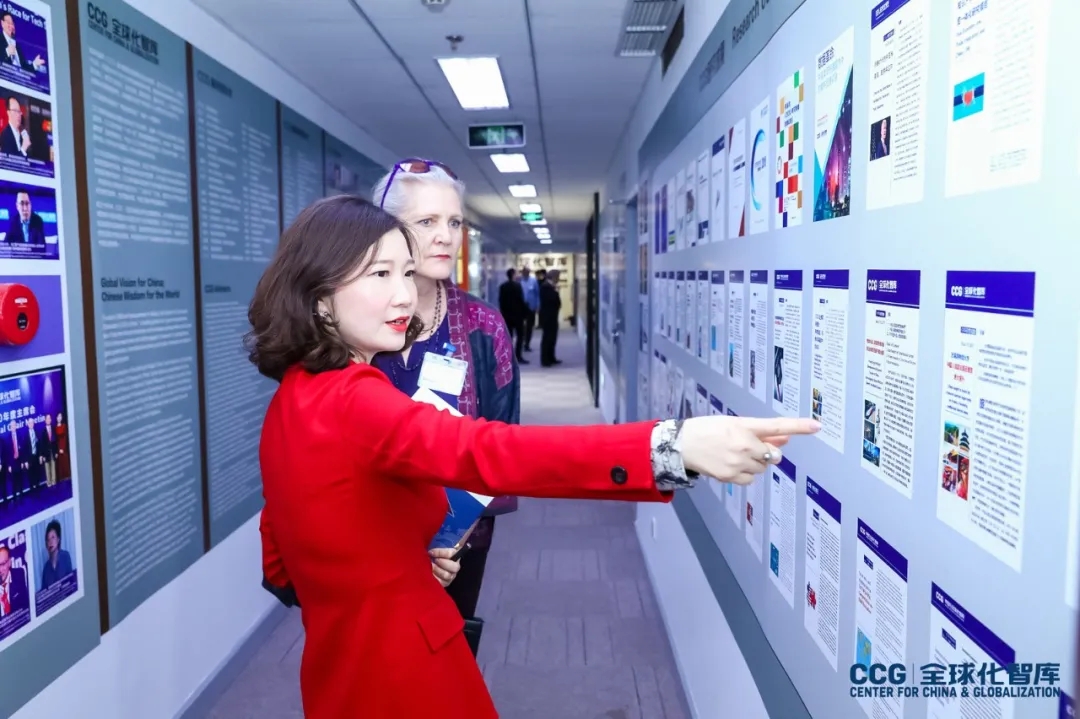【CGTN】Wang.Huiyao:Creating.a.new.Chinese.narrative.in.the.global.arena
2021-09-08 14:33阅读:
August 30 , 2021
 Dr. Mabel Lu Miao, the Co-founder, Vice President and
Secretary General of Center for China and Globalization (CCG),
shares stories with a foreign guest in the halls of CCG
office
By Wang Huiyao | Founder of the Center
for China and Globalization(CCG)
Dr. Mabel Lu Miao, the Co-founder, Vice President and
Secretary General of Center for China and Globalization (CCG),
shares stories with a foreign guest in the halls of CCG
office
By Wang Huiyao | Founder of the Center
for China and Globalization(CCG)
Yale historian and the author of The Search for Modern China
Jonathan Spence once said, “One aspect of a country’s greatness is
surely its capacity to attract and retain the attention of
others.”
In recent years, China’s voice has indeed become stronger in the
international arena. However, narratives about China have often
become distorted in the current complex geopolitical
environment.
China’s international image, on the one hand, has been sometimes
colored by Western stereotypes and reporting, which has undermined
the credibility of China’s international discourse. Since the
outbreak of the COVID-19 in particular, despite China’s
achievements in combating the pandemic, a survey done by the Pew
Research Center revealed that views of China turned sharply
negative in 14 countries last year.
At the same time, Chinese voices could do more to inform the
narrative surrounding the country’s rise proactively. How to create
a national image that is “trustworthy, lovable and respectable”?
How can China “be open and confident, but also be modest and
humble” when communicating with others in the world? These
questions deserve some serious thought.
I talk about China to the World, the Center for China and
Globalization’s new book, discusses how to tell a real and
comprehensive story about China on global stages such as the Munich
Security Conference, the Paris Peace Forum and the Davos World
Economic Forum.
As a non-governmental think tank, CCG has delved into telling
China’s story for over a decade and gradually formed a new
narrative that contains three parts (stance, methodology and
attitude) when “speaking about China” to the World.
To begin with, China’s new narrative stance seeks to convey the
country’s embrace of globalization to the World based on common
values and universal issues that China shares with other
nations.
The best narrative aims to create an emotional resonance between
the storyteller and the audience. Telling one’s own stories without
listening is far from enough. A country should understand the
historical and cultural context and real demands that others
face.
 “I talk about China to the World” is the Center for China and
Globalization’s new book on how to tell a real and comprehensive
story about China on global stages.
“I talk about China to the World” is the Center for China and
Globalization’s new book on how to tell a real and comprehensive
story about China on global stages.
Given major gaps in understanding between countries, China ought to
listen and then relate what we want to say to topics and themes
that resonate with the audience. We should tell China’s story with
reference to shared global values, the country’s contribution to
globalization, and its story of development and the issues it
faces.
As for the new narrative methodology, one way is to speak using
figures and facts to tell more about China’s contribution to
globalization. The other is to initiate an eclectic
non-governmental narrative discourse sharing stories across the
realms of policy, diplomacy, commerce, and individual experience,
set in the context of Chinese culture and the logic of China’s
development.
Action speaks louder than words. We should engage in international
mainstream forums and media and make Chinese views be heard to a
wider audience. It is crucial to accept invitations from
international mainstream media. We shouldn’t refuse to engage just
because the other side might be unfriendly or hold views difficult
for us to accept. We should establish extensive exchanges and
dialogue in the Chinese and foreign political, commercial and
research circles to promote Track II diplomacy.
In the age of public diplomacy, everyone has a say. If one wants to
be understood by a wider, younger generation, thanks to social
media, one can make his or her voice heard. The public can also
tell Chinese stories through different platforms. Scholars with
strong expertise can often explain Chinese ideas and solutions more
clearly and concisely. The two can complement each other.
Also, China should create new international exchange platforms and
launch a new type of multilateral international organization,
actively setting agendas to expand influence on various issues via
international mainstream platforms.
Telling effective stories in the international area requires a
proactive approach to shaping the topics of debate. This means
keeping up with international and domestic hot issues and enhancing
the influence of think tanks through multi-channel dissemination.
Tell the story well, and more people in more countries will be
interested in understanding the real issues.
Speaking of the narrative “attitude,” one should be humble and
confident, inclusive and position-driven with mutual respect when
“telling China’s story” on the world stage. Humility does not mean
self-abasement. To be tolerant isn’t to lack a firm stance.
In international exchanges, conveying our ideas does not require an
acerbic tone to convince others or refute arguments. Stories about
China need concrete ideas and details. Effective communication is
to disseminate our own ideas out into the world. The more rich and
detailed the stories, the more audiences will be curious and want
to listen more.
We should highlight positive issues with an emphasis on
multilateral cooperation. Once these become central to public
discourse, the discussion about China will be more about China’s
contributions and mutually beneficial cooperation between China and
other countries in addressing global challenges. Perceptions of
China will improve as the world gets to know the country
better.
From CGTN, 2021-8-30


